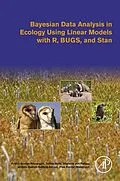Bayesian Data Analysis in Ecology Using Linear Models with R, BUGS, and STAN examines the Bayesian and frequentist methods of conducting data analyses. The book provides the theoretical background in an easy-to-understand approach, encouraging readers to examine the processes that generated their data. Including discussions of model selection, model checking, and multi-model inference, the book also uses effect plots that allow a natural interpretation of data.Bayesian Data Analysis in Ecology Using Linear Models with R, BUGS, and STAN introduces Bayesian software, using R for the simple modes, and flexible Bayesian software (BUGS and Stan) for the more complicated ones. Guiding the ready from easy toward more complex (real) data analyses ina step-by-step manner, the book presents problems and solutions-including all R codes-that are most often applicable to other data and questions, making it an invaluable resource for analyzing a variety of data types. - Introduces Bayesian data analysis, allowing users to obtain uncertainty measurements easily for any derived parameter of interest - Written in a step-by-step approach that allows for eased understanding by non-statisticians - Includes a companion website containing R-code to help users conduct Bayesian data analyses on their own data - All example data as well as additional functions are provided in the R-package blmeco
Autorentext
Fränzi Korner-Nievergelt has been working as a statistical consultant since 2003. Dr. Korner-Nievergelt conducts research in ecology and ecological statistics at the Swiss Ornithological Institute and oikostat GmbH. Additionally, she provides data analyses for scientific projects in the public and private sector. A large part of her work involves teaching courses for scientists at scientific institutions and private organizations.
Klappentext
Bayesian Data Analysis in Ecology Using Linear Models with R, BUGS, and STAN examines the Bayesian and frequentist methods of conducting data analyses. The book provides the theoretical background in an easy-to-understand approach, encouraging readers to examine the processes that generated their data. Including discussions of model selection, model checking, and multi-model inference, the book also uses effect plots that allow a natural interpretation of data. Bayesian Data Analysis in Ecology Using Linear Models with R, BUGS, and STAN introduces Bayesian software, using R for the simple modes, and flexible Bayesian software (BUGS and Stan) for the more complicated ones. Guiding the ready from easy toward more complex (real) data analyses ina step-by-step manner, the book presents problems and solutions-including all R codes-that are most often applicable to other data and questions, making it an invaluable resource for analyzing a variety of data types.
- Introduces Bayesian data analysis, allowing users to obtain uncertainty measurements easily for any derived parameter of interest
- Written in a step-by-step approach that allows for eased understanding by non-statisticians
- Includes a companion website containing R-code to help users conduct Bayesian data analyses on their own data
- All example data as well as additional functions are provided in the R-package blmeco
Inhalt
1. Why Do We Need Statistical Models? 2. Prerequisites and Vocabulary 3. The Bayesian and Frequentist Ways of Analyzing Data 4. Normal Linear Models 5. Likelihood 6. Assessing Model Assumptions: Residual Analysis 7. Linear Mixed Effects Model LMM 8. Generalized Linear Model GLM 9. Generalized Linear Mixed Model GLMM 10. Posterior Predictive Model Checking and Proportion of Explained Variance 11. Model Selection and Multi-Model Inference 12. Markov Chain Monte Carlo Simulation (MCMC) 13. Modeling Spatial Data Using GLMM 14. Advanced Ecological Models 15. Prior Influence and Parameter Estimability 16. Checklist 17. What Should I Report in a Paper?
